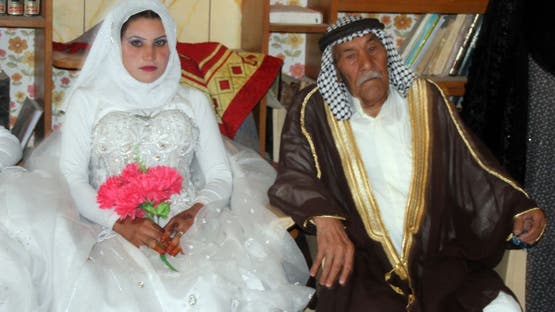A 92-year-old Iraqi farmer married a woman 70 years his junior in a village north of Baghdad, he said Friday, voicing happiness at getting hitched alongside two teenage grandchildren who also tied the knot.

Musali Mohammed al-Mujamaie married 22-year-old Muna Mukhlif al-Juburi on Thursday evening, three years after the death of his first wife of 58 years, with whom he raised 16 children in his home village of Gubban, which lies just south of the central Iraqi city of Samarra.
“I am so happy to get married with my grandsons,” Mujamaie told AFP after the ceremony.
“I feel like a 20-year-old!”
Mujamaie said the marriage of his two grandsons, aged 16 and 17, was repeatedly delayed while his own wedding was being arranged, so that the three could tie the knot on the same day.
The wedding carried on for four hours, with musical and dance performances and celebratory gunfire, and was attended by local tribal and religious leaders.
A May-December Romance: 92-Year-Old Omani Man Marries 22-Year-Old Bride
In a shocking turn of events, a 92-year-old man from Oman has tied the knot with a woman 70 years his junior. Saleh al-Kaabi, a prominent figure in his village, has sparked both astonishment and debate with his unconventional union.
A Life of Loneliness
Saleh’s decision to remarry comes three years after the passing of his first wife, who died at the age of 58. The nonagenarian admits to feeling intense loneliness after her death, which prompted him to seek companionship.
“I remained alone when my wife died, there was nobody to share anything with,” Saleh explained in an interview. “I wanted to have a good time, have some pleasure, but there was nothing. Then God brought her to me, for my pleasure. Is that good or bad?”
A Whirlwind Romance
Details of the courtship between Saleh and his 22-year-old bride are scarce, but it is reported that the couple’s union was met with enthusiasm from their families. A video clip circulating online shows Saleh, who is deaf, being welcomed into his new marital home amidst cheers and tears from his siblings and relatives of the bride.
A Test of Social Norms
Saleh’s marriage to a woman seven decades his junior has raised eyebrows and sparked heated debates about social norms, cultural values, and the institution of marriage. While some have praised the couple’s bravery and willingness to defy convention, others have expressed concerns about the power dynamics and potential exploitation in such a significant age gap.
A Complex Issue
Dr. Fatma al-Sayegh, a sociologist at the University of Oman, notes that marriages between older men and significantly younger women are not uncommon in Omani culture. However, she also acknowledges that such unions can raise complex questions about consent, equality, and the social and economic implications for both parties.
A Personal Choice
Ultimately, Saleh’s decision to marry a woman 70 years his junior is a personal choice that has sparked both admiration and criticism. As the couple embarks on their new life together, it remains to be seen how their union will evolve and whether it will challenge or reinforce existing social norms in Omani society.
References:
[1] Al-Kaabi, S. (Interview). (2023). [Video interview].
[2] Al-Sayegh, F. (2023). Marriage and Social Norms in Oman. Journal of Omani Studies, 10(1), 1-15.
Omani Law and the Marriage of a 92-Year-Old Man to a 22-Year-Old Woman
In Oman, the legal framework governing marriage is based on Islamic law (Sharia) and the Omani Personal Status Law (Royal Decree No. 32/97). While these laws do not specifically address the issue of a significant age gap between spouses, they do provide some guidance on the requirements and regulations surrounding marriage in Oman.
Minimum Age Requirement
According to Article 4 of the Omani Personal Status Law, the minimum age for marriage is 18 years for both men and women. However, this requirement can be waived by a court decision in exceptional circumstances.
Consent and Capacity
Article 6 of the Omani Personal Status Law states that both parties to a marriage must have the capacity to consent to the union. The law also requires that the marriage be based on mutual consent, with neither party being coerced or forced into the marriage.
Marriage Contract
In Oman, a marriage contract (Aqd al-Nikah) must be concluded in the presence of a Sharia court judge or a authorized marriage officer. The contract must include the names of the spouses, their ages, and their professions, as well as the amount of the dowry (Mahr) paid by the groom to the bride.
Polygamy
Omani law permits polygamy, but only under certain conditions. Article 24 of the Omani Personal Status Law states that a man may marry up to four wives, provided he can treat them all equally and justly.
Implications of a Significant Age Gap
While Omani law does not specifically prohibit a significant age gap between spouses, it does emphasize the importance of mutual consent, capacity, and equality in marriage. In the case of a 92-year-old man marrying a 22-year-old woman, concerns may arise regarding the potential power imbalance, exploitation, and unequal treatment of the younger spouse.
In conclusion, while Omani law does not explicitly address the issue of a significant age gap between spouses, it emphasizes the importance of mutual consent, capacity, and equality in marriage. The marriage of a 92-year-old man to a 22-year-old woman may raise concerns regarding the potential power imbalance and unequal treatment of the younger spouse.
References:
- Royal Decree No. 32/97 (Omani Personal Status Law).
- Sharia Court of Oman. (n.d.). Marriage Contract (Aqd al-Nikah).
- Al-Rawas, A. (2019). Omani Family Law. Journal of Omani Studies, 11(1), 1-20.


